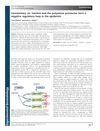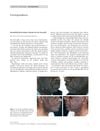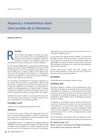 1 citations,
January 2022 in “Journal of Pharmaceutical Sciences”
1 citations,
January 2022 in “Journal of Pharmaceutical Sciences” The new skin cream with FOL-005 safely promotes hair growth and is stable and user-friendly.
 February 2022 in “Journal of Clinical and Experimental Investigations”
February 2022 in “Journal of Clinical and Experimental Investigations” People with Fibromyalgia Syndrome often have skin symptoms, which can worsen their quality of life and increase depression.
 16 citations,
July 2012 in “Current pharmaceutical biotechnology”
16 citations,
July 2012 in “Current pharmaceutical biotechnology” New treatments for skin conditions related to the sebaceous gland are being developed based on current research.
 September 2004 in “Experimental dermatology”
September 2004 in “Experimental dermatology” Melatonin directly affects mouse hair follicles and may influence hair growth.
 15 citations,
May 2020 in “Journal of Dermatological Treatment”
15 citations,
May 2020 in “Journal of Dermatological Treatment” PRP treatment increases hair density and thickness in androgenetic alopecia by 79%.
 5 citations,
October 2013 in “Experimental Dermatology”
5 citations,
October 2013 in “Experimental Dermatology” The commentary explains that a balance of HR protein and putrescine is important for normal hair growth.
 January 2006 in “The Journal of Korean Medicine Ophthalmology and Otolaryngology and Dermatology”
January 2006 in “The Journal of Korean Medicine Ophthalmology and Otolaryngology and Dermatology” Rubus coreanum may help hair growth but not through the tested mechanisms, and none of the herbal extracts help with acne.
 1 citations,
January 2022 in “Journal of experimental and clinical medicine”
1 citations,
January 2022 in “Journal of experimental and clinical medicine” PCOS is linked to diabetes and insulin resistance, and managing AGEs may help treat related symptoms.
 5 citations,
December 2018 in “Journal of Cosmetic Dermatology”
5 citations,
December 2018 in “Journal of Cosmetic Dermatology” PRP treatment improves hair count, density, and reduces hair loss in AGA patients.
 13 citations,
September 2008 in “Experimental and Clinical Endocrinology & Diabetes”
13 citations,
September 2008 in “Experimental and Clinical Endocrinology & Diabetes” Young women with PCOS without additional risk factors may have normal heart function.
 6 citations,
May 2012 in “Clinical and experimental dermatology”
6 citations,
May 2012 in “Clinical and experimental dermatology” Oral minoxidil can cause inflamed, ingrown hairs in the beard area.
 5 citations,
September 2021 in “Frontiers in Cell and Developmental Biology”
5 citations,
September 2021 in “Frontiers in Cell and Developmental Biology” Dihydrotestosterone treatment on 2D and 3D-cultured skin cells slows down hair growth by affecting certain genes and could be a potential target for hair loss treatment.
 31 citations,
December 2014 in “Advances in Clinical and Experimental Medicine”
31 citations,
December 2014 in “Advances in Clinical and Experimental Medicine” Stem cells could improve plastic surgery but are not widely used due to cost and safety concerns.
March 2023 in “Advances in Clinical and Experimental Medicine” Oral and topical finasteride are effective and safe for treating female hair loss.
 11 citations,
January 2016 in “Journal of clinical & experimental dermatology research”
11 citations,
January 2016 in “Journal of clinical & experimental dermatology research” Substance abuse can cause various skin problems, including marks from injections, sores, premature aging, and increased cancer risk.
 109 citations,
November 2005 in “The journal of investigative dermatology. Symposium proceedings/The Journal of investigative dermatology symposium proceedings”
109 citations,
November 2005 in “The journal of investigative dermatology. Symposium proceedings/The Journal of investigative dermatology symposium proceedings” Targeting hair follicles can improve skin treatments and reduce side effects.
 136 citations,
April 2016 in “Dermatologic Surgery”
136 citations,
April 2016 in “Dermatologic Surgery” PRP treatment helps hair growth and density in androgenetic alopecia patients.
 9 citations,
October 2014 in “Experimental and Clinical Endocrinology & Diabetes”
9 citations,
October 2014 in “Experimental and Clinical Endocrinology & Diabetes” Knuckle Acanthosis Nigricans is common in Latin American youth and may indicate early insulin resistance, especially in those with normal weight.
 20 citations,
April 2021 in “Journal of Womens Health”
20 citations,
April 2021 in “Journal of Womens Health” Testosterone can help premenopausal and postmenopausal women with low sexual desire, but its long-term safety is unclear and it's not widely approved for this use.
 17 citations,
January 2015 in “MedChemComm”
17 citations,
January 2015 in “MedChemComm” New treatments for prostate cancer are less toxic and show promise, but more research is needed to enhance their effectiveness and reduce side effects.
 9 citations,
January 2018 in “Medical research archives”
9 citations,
January 2018 in “Medical research archives” Low-intensity light therapy is effective for skin healing, reducing inflammation, and treating various skin conditions.
 3 citations,
August 1980 in “Acs Symposium Series”
3 citations,
August 1980 in “Acs Symposium Series” Hair increases in size when it absorbs water, and treatments like bleaching affect how much water it can take in.
200 citations,
August 2009 in “Experimental dermatology” Eating high-glycemic foods and drinking milk may worsen acne by increasing insulin and IGF-1 levels.
4 citations,
May 2009 in “Clinical and experimental dermatology” Flexural follicular lichen planus is a rare skin condition affecting body folds.
 50 citations,
August 1999 in “Experimental dermatology”
50 citations,
August 1999 in “Experimental dermatology” The control system for hair growth cycles is not well understood and needs more research.
 80 citations,
November 1975 in “Acta dermato-venereologica”
80 citations,
November 1975 in “Acta dermato-venereologica” Large doses of glucocorticoids are not suitable for general use in treating severe alopecia areata due to inconsistent results and risks.
 1 citations,
August 2023 in “The journal of pharmacology and experimental therapeutics/The Journal of pharmacology and experimental therapeutics”
1 citations,
August 2023 in “The journal of pharmacology and experimental therapeutics/The Journal of pharmacology and experimental therapeutics” Kir6.1 mutations in Cantú syndrome increase channel sensitivity and hyperpolarization, while SUR2B mutations do not.
 3 citations,
January 2024 in “Liver International”
3 citations,
January 2024 in “Liver International” Targeting thyroid hormone receptor α in liver cells may help treat liver fibrosis.
 September 2012 in “Medicina estética/Medicina estética”
September 2012 in “Medicina estética/Medicina estética” More research is needed to confirm if laser therapy effectively treats hair loss.
 January 2023 in “Skin appendage disorders”
January 2023 in “Skin appendage disorders” Laser treatment for hair loss works equally well on different skin types, but more research is needed for very dark skin.



























